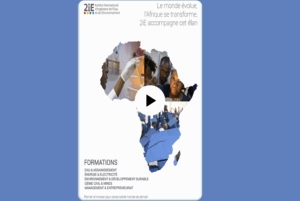
Hydrology training in partnership with UNESCO

This presentation, entitled “Hydrology training in partnership with UNESCO,” outlines a project that followed a forum held in Yamoussoukro, the capital of Côte d’Ivoire, in July 2014. Africa is one of UNESCO’s priorities. The FMTS is an official partner of UNESCO[1]. A ten-member NGO-UNESCO Liaison Committee, elected every two years, is responsible for organizing forums (in principle two per year). Since the early 2000s, a group of NGOs called the Joint Programmatic Commission on Science and Ethics (CPM-SE) has been working on water issues and bioethics. Josette Rome-Chastanet, a member of the International Secretariat of the WFSW, was the main driving force behind the work on water. “Africa does not lack water,” she repeated over and over again, backed up by scientific documents, “it lacks hydrologists… and not just men, but women as well.”
The conditions were therefore in place in 2012 to bring together a large number of participants in Africa on this subject. During the two years of preparation for the Forum, some 40 NGOs mobilized to ensure its success. The Forum was entitled “Access to water for all in Africa – A fundamental human right.” The forum, hosted by the Mayor of Yamoussoukro, chaired by the Prime Minister of Côte d’Ivoire, and attended by the Ambassador of Côte d’Ivoire to UNESCO, Ms. Houphouet Boigny, was a success, with a packed audience of 400 to 500 participants. It concluded with the Yamoussoukro Appeal: “LET’S MAKE IT HAPPEN! FROM PROMISES TO ACTION!”[2] It was not easy to agree on the title or content of the appeal. All UNESCO Member States received and approved the appeal. Ten NGOs decided to take action.
The FMTS’s years of involvement have been rewarded by mutual knowledge and esteem among those responsible[3], to such an extent that the idea of a lasting partnership between the FMTS and NGOs has emerged in Chad. This partnership is currently being established.
_____________________________________________________________________
[1] UNESCO currently has 424 official NGO partners.
[2] Appeal translated into the six official languages of UNESCO
[3] With regard to the FMTS: Madagascar, Mali, and Chad



